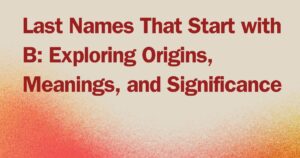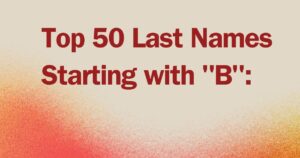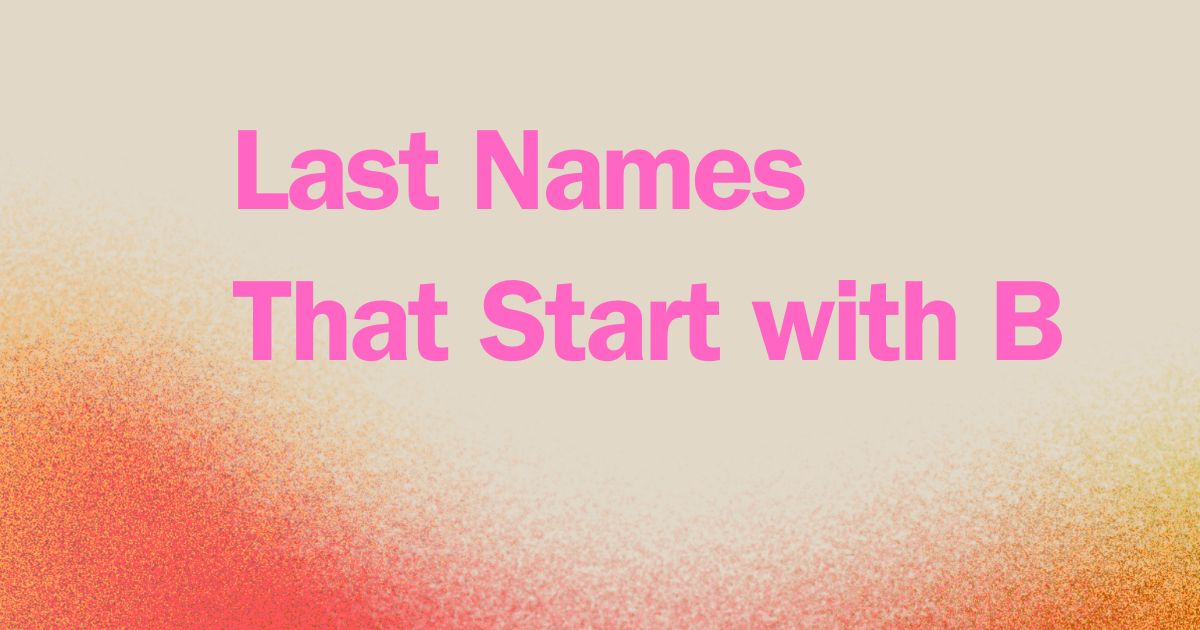Last Names That Start with B: Exploring Origins, Meanings, and Significance
Introduction:
Last names hold a special significance, often serving as a link to one’s heritage and ancestry. In this article, we’ll delve into the world of last names that start with the letter “B”, exploring their origins, meanings, and cultural significance.

History of Last Names:
Surnames have a rich history dating back centuries. They were originally used to distinguish between individuals and families in communities. As societies evolved, last names became hereditary, passed down through generations. This transition laid the foundation for the diverse range of surnames we see today, including those beginning with the letter “B”.
Cultural Significance:
Last names are more than just labels; they often reflect cultural heritage and historical influences. Whether it’s the patronymic surnames of Scandinavia or the occupational surnames of England, each name tells a story. Within the realm of last names starting with “B”, we find a tapestry of cultural diversity and meaning.

Top 10 Last Names Starting with “B”:
Baker: This occupational surname originated from the occupation of baking. It was typically given to individuals who worked as bakers or were associated with baking in some capacity.
Brown: “Brown” likely described someone with brown hair, complexion, or clothing. It may also have referred to individuals who lived near a prominent brown feature in the landscape.
Bailey: Derived from the Old English word “baili”, meaning a bailiff or officer of the court. It was often used as an occupational surname for individuals who held such positions within the legal system.
Bennett: This surname is of medieval English origin and is derived from the given name “Benedict”, meaning “blessed”. It was often bestowed upon children in the hopes of bringing them good fortune.
Bell: “Bell” is a surname of English and Scottish origin, derived from the Middle English word “belle”, meaning “bell”. If someone lived close to a bell tower or worked as a bell ringer, they might have adopted it as their occupational surname.
Bishop: Originally denoted someone who worked as a bishop’s servant or who lived near a bishop’s residence. It derives from the Old English word “biscop”, meaning “bishop”.
Bradley: Derived from the Old English words “brad” meaning “broad” and “leah” meaning “clearing” or “meadow”. It likely referred to someone who lived near a broad meadow.
Black: Likely described someone with black hair, complexion, or clothing. It may also have been used to denote someone who worked with black dye or coal.
Brooks: A topographic surname derived from the Old English word “broc”, meaning “stream” or “brook”. It likely denoted someone who lived near a brook or stream.
Barnes: Derived from the Old English word “bere” meaning “barley” and “hūs” meaning “house”. It likely referred to someone who lived near a barn or a storehouse for barley.
Butler: Originally an occupational surname for the chief servant of a household, derived from the Old French word “butuiller” meaning “bottle bearer”.
Burton: Derived from the Old English words “burh” meaning “fortress” or “town” and “tūn” meaning “enclosure” or “settlement”. It likely referred to someone who lived near a fortified town or settlement.
Bates: Derived from the Old English word “bat” meaning “boot” or “shoe”. It was likely an occupational surname for a maker or seller of boots or shoes.
Byrne: Of Irish origin, derived from the Gaelic word “Ó Broin” meaning “descendant of Bran”, where “Bran” is a personal name meaning “raven”.
Bush: Likely described someone who lived near a bushy or wooded area. It may also have been used as a nickname for someone with a thick or bushy growth of hair.
Ball: Derived from the Old English word “beall”, meaning “ball” or “round object”. It may have been used as a nickname for someone who was round or plump.
Bond: Originally an occupational surname for a peasant farmer or a tenant farmer who held land under obligation to work for the lord of the manor.
Burgess: Derived from the Old French word “burgeis” meaning “freeman” or “town dweller”. It was often used as an occupational surname for someone who lived or worked in a fortified town or borough.
Becker: Derived from the German word “becker”, meaning “baker”. It was likely an occupational surname for someone who worked as a baker.
Brewer: An occupational surname for someone who brewed ale or beer.Its root is the Old English verb “breowan,” which means “to brew.”
Baldwin: Derived from the Old English personal name “Bealdwine”, composed of the elements “beald” meaning “bold” or “brave” and “wine” meaning “friend”.
Barry: Of Irish origin, derived from the Gaelic word “Ó Beargha” meaning “descendant of Beargh”, where “Beargh” is a personal name of uncertain origin.
Beck: Derived from the Old Norse word “bekkr”, meaning “stream” or “brook”. It likely denoted someone who lived near a stream or brook.
Burgess: Derived from the Old French word “burgeis” meaning “freeman” or “town dweller”. It was often used as an occupational surname for someone who lived or worked in a fortified town or borough.
Burns: Derived from the Middle English word “burne”, meaning “stream” or “spring”. It likely denoted someone who lived near a stream or spring.
Brock: Derived from the Old English word “broc”, meaning “badger”. It may have been used as a nickname for someone with qualities associated with a badger, such as tenacity or aggression.
Brady: Of Irish origin, derived from the Gaelic word “Ó Brádaigh” meaning “descendant of Brádach”, where “Brádach” is a personal name possibly meaning “large-chested” or “spirited”.
Bentley: Derived from the Old English words “beonet” meaning “bent grass” and “lēah” meaning “wood” or “clearing”. It likely referred to someone who lived near a wooded area with bent grass.
Burg: Derived from the Old English word “burg”, meaning “fortress” or “town”. It may have been used as a topographic surname for someone who lived near a fortified town.
Burt: Derived from the Old English word “burh”, meaning “fortress” or “town”. It likely referred to someone who lived near a fortified town or settlement.
Beasley: Derived from the Old English personal name “Beorn”, meaning “bear” or “warrior”, combined with the Old English word “lēah” meaning “wood” or “clearing”.
Bass: Derived from the Middle English word “bass” meaning “bass fish”. It may have been used as a nickname for someone who resembled a bass fish in some way.
Barr: Derived from the Old English word “bearu”, meaning “grove” or “woodland”. It likely referred to someone who lived near a grove or woodland.
Brock: Derived from the Old English word “broc”, meaning “badger”. It may have been used as a nickname for someone with qualities associated with a badger, such as tenacity or aggression.
Buckley: Derived from the Old English words “bucc” meaning “male deer” and “lēah” meaning “wood” or “clearing”. It likely referred to someone who lived near a woodland frequented by deer.
Baxter: An occupational surname derived from the Middle English word “bakstere”, meaning “baker”. It was typically given to individuals who worked as bakers or were associated with baking in some capacity.
Boyd: Of Scottish origin, derived from the Gaelic word “buidhe” meaning “yellow”. It may have been used as a nickname for someone with fair or blond hair.
Best: Derived from the Old English word “bēost”, meaning “barley”. It may have been an occupational surname for someone who grew or harvested barley.
Branch: Derived from the Old French word “branche”, meaning “branch” or “limb”. It may have been used as a topographic surname for someone who lived near a prominent tree branch.
Bonner: Of Scottish origin, derived from the Gaelic word “bonnach” meaning “cake” or “bannock”. It may have been an occupational surname for someone who baked or sold cakes or bannocks.
Bloom: Derived from the Middle English word “blome”, meaning “flower” or “blossom”. It may have been a nickname for someone with a cheerful or blossoming personality.
Burgos: Of Spanish origin, derived from the Spanish word “burgos” meaning “fortified town”. It may have been a topographic surname for someone who lived near a fortified town.
Bull: Derived from the Middle English word “bulle”, meaning “bull”. It may have been a nickname for someone with qualities associated with a bull, such as strength or stubbornness.
Bartlett: Derived from the Middle English personal name “Bartlet”, a diminutive of “Bartholomew”. It was often used as a given name in medieval England and later became a surname.
Bowie: Of Scottish origin, derived from the Gaelic word “buidhe” meaning “yellow”. It may have been a nickname for someone with fair or blond hair.
Briggs: Derived from the Old English word “brycg”, meaning “bridge”. It may have been a topographic surname for someone who lived near a bridge or a bridge keeper.
Burch: Derived from the Old English word “burh”, meaning “fortress” or “town”. It likely referred to someone who lived near a fortified town or settlement.
Bono: Of Italian origin, derived from the Italian word “buono” meaning “good” or “kind”. It may have been a nickname for someone with a pleasant or amiable disposition.
Barrera: Of Spanish origin, derived from the Spanish word “barrera” meaning “barrier” or “obstacle”. It may have been a topographic surname for someone who lived near a barrier or boundary.
These meanings provide insight into the diverse origins and historical significance of the top 50 last names starting with “B”. Each surname carries with it a story of ancestry, occupation, or geographical origin, enriching our understanding of human history and heritage.
conclusion
In conclusion, the diverse array of last names starting with “B” reflects the richness of human history and heritage. From occupational surnames like “Baker” and “Barker” to topographic surnames like “Brooks” and “Branch”, each name carries with it a unique story of ancestry and cultural significance.
Through the meanings and origins of these last names, we gain insight into the lives and occupations of our ancestors, as well as the geographical landscapes they inhabited. Whether derived from occupations, physical characteristics, or geographical features, these surnames serve as a lasting legacy, connecting us to our past and shaping our sense of identity.
As we explore the meanings behind these last names, we uncover a tapestry of human experiences and traditions, spanning continents and centuries. From the bustling streets of medieval towns to the tranquil beauty of wooded clearings, each name evokes a sense of history and belonging.
In a world of ever-changing trends and technologies, our last names serve as anchors, grounding us in the stories of those who came before us. They remind us of our shared humanity and the enduring connections that bind us together across time and space.
So whether your last name is “Brown” or “Burgos”, “Baker” or “Bono”, take pride in the rich tapestry of your heritage. Embrace the stories behind your name and celebrate the diverse legacy of the human experience.
In the end, our last names are more than just words on a page—they are symbols of resilience, perseverance, and the enduring spirit of humanity. So let us honor the legacy of those who came before us, and carry their stories forward into the future with pride and reverence.
FAQs
What are some common meanings behind last names that start with “B”?
Common meanings behind last names starting with “B” include occupational origins (e.g., Baker), descriptive characteristics (e.g., Brown), geographical features (e.g., Brooks), and patronymic origins (e.g., Bennett).
Are there any well-known people whose last names begin with “B”?
Yes, there are many famous individuals with last names starting with “B”, including actors (e.g., Sandra Bullock), musicians (e.g., Beyoncé), politicians (e.g., Joe Biden), and athletes (e.g., LeBron James).
How do last names that start with “B” vary across different cultures?
Last names starting with “B” can vary significantly across different cultures. For example, “Baker” may be a common surname in English-speaking countries, while “Bianchi” is more prevalent in Italian-speaking regions.
What are some common spelling variations of last names that start with “B”?
Common spelling variations of last names starting with “B” include “Baker” spelled as “Baeker” or “Becker”, and “Brown” spelled as “Braun” or “Browne”.
How can I research the origin and meaning of my last name that starts with “B”?
You can research the origin and meaning of your last name starting with “B” by consulting genealogical records, surname databases, and historical sources. Additionally, online resources and family history websites may provide valuable insights into the origins of your surname.

